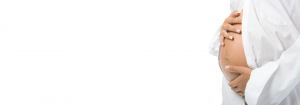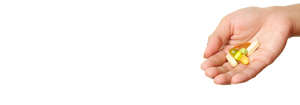Iodine in pregnancy and lactation (breastfeeding)

Why is iodine needed?
Iodine is important for the development of the baby’s brain. For this reason it is important that pregnant women meet their requirement for iodine so that sufficient iodine and thyroid hormones are transferred to the developing baby throughout pregnancy.
As the brain continues to develop in early life, iodine is important during breastfeeding. Breast milk is the only source of iodine for babies who are exclusively breastfed.
Iodine before conception
You should make sure that you have been having enough iodine in your diet for several months before you get pregnant. This is because iodine is required from the very early stages of pregnancy – before you may even know that you are pregnant.
Your body can store iodine in the thyroid gland. These stores of iodine can then be used to provide thyroid hormone and iodine to your developing baby and to make sure that you are able to continue to produce sufficient thyroid hormones throughout your pregnancy.
It is therefore very important that if you are of childbearing age, and if you are planning a pregnancy, you make sure that you are consuming enough iodine.
How much iodine do you need?
The recommendation for adults is for 150 micrograms of iodine per day. If you are of childbearing age it is important to meet this requirement so that you can prepare for pregnancy.
During pregnancy and breastfeeding, the recommendation is for 200 micrograms/day [according to the European Food Safety Authority (EFSA) 2014].
Which foods are important for adequate iodine?
See our section on diet. The main sources of iodine in the UK diet are milk and dairy products. Fish is also a rich source of iodine.
The diet advice that is already given to women who are pregnant will ensure good sources of iodine are eaten. For example, the NHS advise that if you are pregnant you should have at least two portions of fish per week (one of which should be an oily fish). This will provide iodine – for example, a 120g portion of cod will give approximately 190 micrograms of iodine. The iodine from fish can be stored in the thyroid to be used on days of the week when you don’t eat fish.
You need to take care with certain types of fish when you are pregnant or planning a pregnancy – see NHS pages for full details. You should not have more than two portions of oily fish (e.g. salmon, mackerel and trout) per week, no more than two tuna steaks or four medium-sized cans of tuna per week. In addition, you should avoid shark, marlin and swordfish. Shellfish should be well cooked and should not be eaten raw.
Do not take kelp or seaweed supplements as they can provide excess iodine.
It can be difficult to meet the higher demands of pregnancy through diet alone if you do not regularly eat foods that are good sources of iodine. Therefore you might need to take a supplement containing iodine. Ideally this should commence around 3 months before you become pregnant – much like folic acid supplements.
Some supplements for pregnant women (e.g. multivitamin and mineral supplements) contain iodine. The dose of iodine in these supplements should be approximately 140 or 150 mcg/day. This means that the remainder of the iodine requirement can be met from the diet. You should not take supplements containing higher doses than this as, along with the iodine from the diet, you could have too much iodine.
Make sure that if you are pregnant, the supplement that you choose is suitable for pregnancy. For more information see NHS advice.
If you have thyroid disease, are taking other medication, or have experienced iodine deficiency over many years, you should speak to your GP before taking additional iodine.
Text written by Dr Sarah Bath and Professor John Lazarus (August 2015, updated January 2020)

